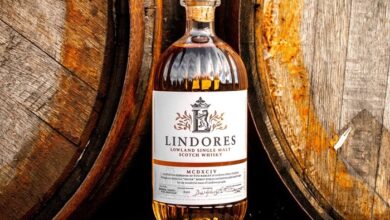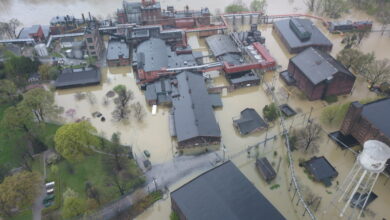Q&A With Malcolm Waring, Old Pulteney
By Kurt Maitland

(Credit: InterBev)
Earlier this summer, I got to meet Malcolm Waring, the distillery manager of Old Pulteney. He graciously gave up some time to discuss some of the changes going on at Wick as well as discuss the first release in Old Pulteney’s upcoming Coastal Series.
KM: Malcolm, it was a pleasure to meet you in NYC. Can you tell our readers a bit about yourself and your history with Old Pulteney?
MW: I moved to Wick as a young boy and grew up here. I joined the Pulteney team in 1990, starting off on the shop floor and working across all areas of the distillery: the maturation warehouses, the mash room, the stills and so on. I worked my way up to Brewing Manager and later became Assistant Distillery Manager. I then became Distillery Manager of Pulteney’s sister distillery, Knockdhu, and stayed there for six years before returning to Pulteney in 2006 as Distillery Manager and have been here making great whisky ever since.
KM: What do you think makes Old Pulteney stand apart from other Scotch distilleries?
MW: Old Pulteney owes much to its hometown of Wick on the northern shores of the Scottish Highlands. At Pulteney, we store our whisky in traditional warehouses that are exposed to the sea air blowing in off the North Sea. Being distilled and matured by the sea coupled with meticulous cask selection creates the distinctive flavor of Old Pulteney which is unlike any other single malt Scotch whisky. Defined and shaped by its coastal location, Old Pulteney truly is The Maritime Malt.
KM: Can you tell us about Old Pulteney’s bond with the town of Wick as well as the ways the distillery actively helps the local community?

MW: As I mentioned, Old Pulteney is inseparable from the town it calls home. The local community is so important to us at Pulteney as it’s where our team live, so we try and support local initiatives and fundraisers as much as we can. For example, we support the annual Wick Gala and sponsor the local pipe band.
We are also a key collaborator in one of the UK’s first ever District Heating Schemes. Locally sourced wood chips are used in a biomass boiler to supply heat to around 200 homes and public buildings in Wick, including the local hospital, as well as providing steam that we use for our production process. This helps us reduce our emissions at Pulteney and provides green energy to the local community; it’s a win-win!
KM: When we meet you had mentioned some changes you have made/wanted to make at the distillery in order to reduce the distillery’s usage of water and to be more conscious about the environment. Can you discuss what you’ve done and what you plan to do? Have you spoken to other distilleries that are doing similar things?
MW: Without water, we can’t make whisky. It’s one of three ingredients needed to make Scotch so it’s important that we do as much as we can to protect our water source. At Pulteney, we get our water from the nearby Loch Hempriggs.
We work in partnership with the Scottish Environment Protection Agency (SEPA) to manage our water usage. Every year we voluntarily shut down the distillery when water levels are low to minimize our impact. This year, we shut down for 7½ weeks and have just started back up again. We’ve also begun trials of High Gravity Mashing which reduces our water consumption per litre of alcohol and we’re happy with the results so plan to use this new yeast strain going forward.
Within the International Beverage group, all of our distilleries are ahead of the curve when it comes to sustainability. However, there isn’t a one size fits all solution. What works best for Pulteney won’t necessarily work for another distillery and vice versa, which is why we’re always trying to find innovative ways of making our production process more environmentally friendly.

(Credit: InterBev)
KM: Let’s discuss the Coastal Series. I loved it and thought it was a great addition to the Old Pulteney lineup. What can you tell us about how this release came to be and what can you tell us about the future of these releases?
MW: The Coastal Series is an exploration of casks matured by the sea. We’ve partnered with spirits makers from coastal locations around the world, further maturing our whisky in a specialist selection of casks and creating four limited-edition expressions that bring new coastal flavors to The Maritime Malt.
We recently launched the first expression in the series to the US, Old Pulteney Pineau des Charentes. Myself and our Master Blender Stuart Harvery first discovered Pineau des Charentes on a trip to France. Pineau des Charentes is native to the Charente-Maritime coastline and once we tried the wine and inspected the casks, we knew a partnership between the two would create something special.
To create Old Pulteney Pineau des Charentes, we firstly matured our whisky in hand-selected American oak casks before transferring to ex-Pineau des Charentes casks which have been crafted using French oak for a number of years. The result is a beautiful sweetness that perfectly complements Old Pulteney’s signature brininess.
The Coastal Series is made up of four expressions which will be released annually, with the first launching in the US in 2023.
KM: Before we go, are there any other releases in the pipeline you can talk about? We would love to hear/get some hints!
MW: We’re always experimenting with different casks and flavor profiles but nothing we can name just yet. Later this year we’ll be unveiling the second expression in The Coastal Series which is due to land on shelves in the US in 2024. Stay tuned!



